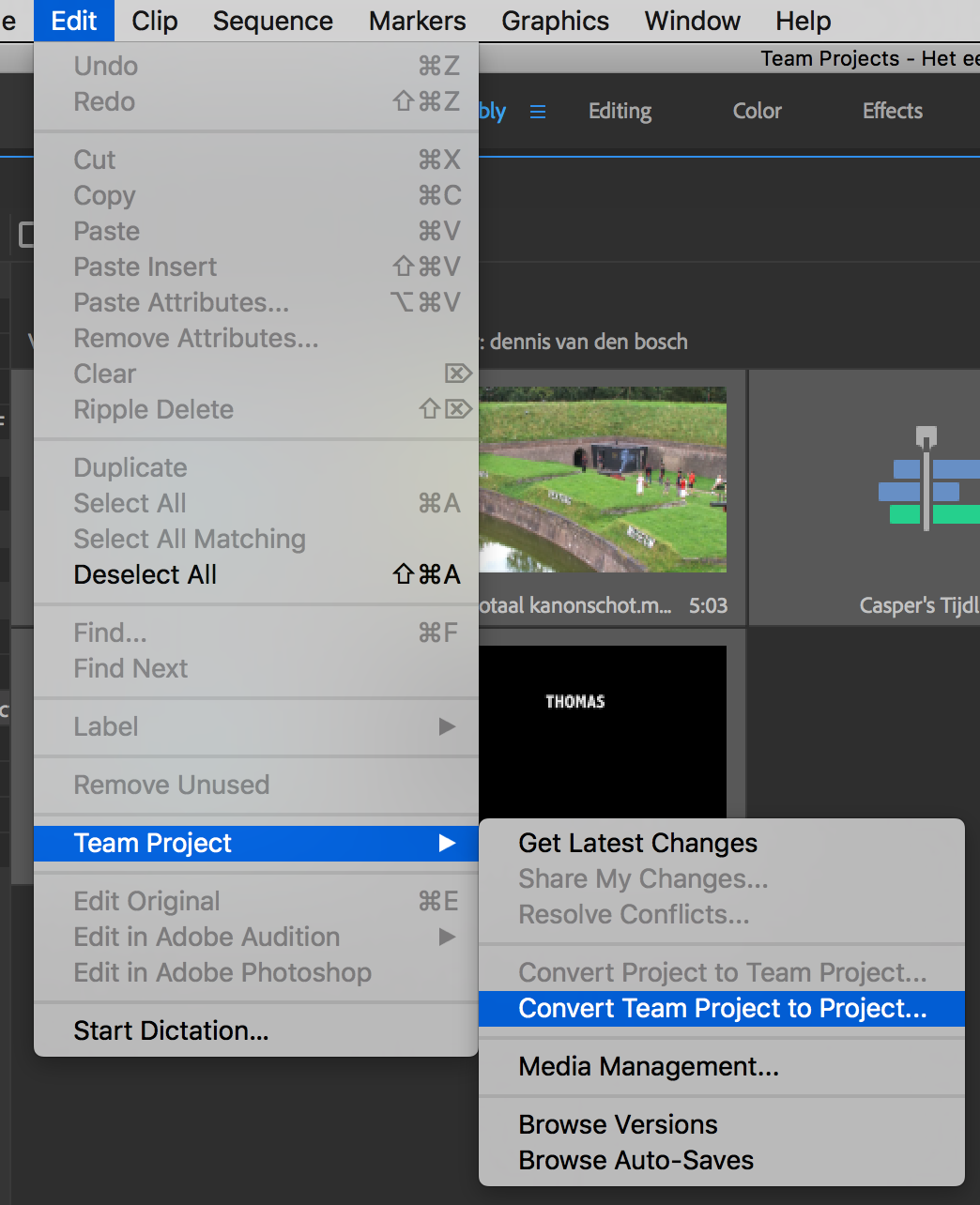- Home
- Team Projects
- Discussions
- Re: is there a way to keep a copy of a team projec...
- Re: is there a way to keep a copy of a team projec...
is there a way to keep a copy of a team project saved locally?
Copy link to clipboard
Copied
We are a small shop, working off a local server. We primarily cut commercials and have the need to have assistants and several editors working on the same project simultaneously. I was really excited about Team Projects as it seems like the answer to our collaboration needs. However, we need to be able to save and access the project from our server and not just in the cloud. Is there a way to keep a copy of a team project saved locally or do they only exist in the cloud. If they only exist in the cloud, considering the sheer volume of work that we do, how do we keep our team project list from getting overwhelmingly huge?
Copy link to clipboard
Copied
You can convert a Team Project to a Project anytime. But this is a manual proces:

Copy link to clipboard
Copied
does converting it make it no longer a Team project or does it make a local copy of the project and keep it a Team project?
Copy link to clipboard
Copied
It will create a new local project form the Team Project. But you will be able to continue working in the team project. So it is good way to make 'local' versions, as you requested. Note that there are some limitations with the feature when you include Ae footage.
Copy link to clipboard
Copied
thanks Joost
Copy link to clipboard
Copied
Whenever you open a Team Project, a local copy is stored on that workstation, so you can keep editing if your internet connection goes down, and so editing is responsive even with a slow internet connection. You can also convert Team Projects to local ones, as Joost pointed out. The original Team Project will still be in your Team Project list, though, and you can't get or share changes with a local project (or while using a Team Project without an internet connection).
As for the Team Projects list, you will only see Team Projects there that you have created, or accepted an invitation to. If you're done with a Team Project that you created, you can remove it from the list with the "Archive" option, and bring it back later if needed. If you didn't create it, you can remove yourself from the collaborators list for the Team Project, and it will no longer appear in your list. You'll need to have someone re-invite you if you want to use it again, though.
Copy link to clipboard
Copied
Thanks for the detailed response Peter. one last question: WHERE does the local copy get placed on my workstation?
Copy link to clipboard
Copied
Glad to help! On the Mac, the local Team Project copies are stored in subdirectories of ~/Library/Application Support/Adobe/Common/Team Projects Local Hub. On Windows, they're in %APPDATA%\Adobe\Common\Team Projects Local Hub. To be clear, they're not in a publicly documented format, and are not .prproj files, but that's where the local databases are stored.
If you're concerned about making additional backups, beyond what's in the cloud, that would be the directory to back up. Each sub-directory holds a database with all of the auto-saves that have been made for a particular Team Project on that machine. The auto-save history is also updated in the cloud when you're connected, so it won't be lost if you delete the local directory.
Your media is not backed up as part of the Team Project, only your edits and paths to the media files.
Copy link to clipboard
Copied
There were no project files in that folder. I suppose it got changed over the years? What are the current folders for local copies?
Copy link to clipboard
Copied
The location has not changed:
Windows: [drive]:\Users\[user]\AppData\Roaming\Adobe\Common\Team Projects Local Hub
Mac: /Users/[user]/Library/Application Support/Adobe/Common/Team Projects Local Hub
But as Peter mentioned: "To be clear, they're not in a publicly documented format, and are not .prproj files, but that's where the local databases are stored."
-Udo
Copy link to clipboard
Copied
The question that would be nice to get an answer here is, if for whatever reason the cloud cannot be accessed, how do you open and use the project?
Copy link to clipboard
Copied
Any Team Project you opened at least once on your machine can be opened without a cloud connection.
Instead of reading from a .prproj file like we do for a local project Team Project information is stored in a local database (.tp2 folder).
If you no longer have access to the cloud, we still save your changes locally, but are no longer able to sync. You can also create a new Team Project while offline. The 'Offline Project' will also be saved to a local database (*.tp2).
Team Project - Local database location:
Windows: C:\Users\[USER]\AppData\Roaming\Adobe\Common\Team Projects Local Hub\2023\synchronized
Mac: /Users/[USER]/Library/Application Support/Adobe/Common/Team Projects Local Hub/2023/synchronized
Copy link to clipboard
Copied
Thanls, but how do you open and work with this file?
Copy link to clipboard
Copied
I sent you and email with instructions.
-Udo
Copy link to clipboard
Copied
I'm interested to know as well. Could you share please?
Copy link to clipboard
Copied
Sent you an email.
-Udo
Copy link to clipboard
Copied
I'm interested to know as well. Could you share, please?
Copy link to clipboard
Copied
Thanks Udo!
Besides converting a Team Project into a local project for archiving purposes (which is the recommended option) you can open A fully functional local version of a Team Project, including its auto-save history that is contained in a .tp2 / .tpr file.
Until now a Team Project was saved in a local database file with the .tp2 extension in a fixed path e.g.:
[WIN] C:\Users\[USER]\AppData\Roaming\Adobe\Common\Team Projects Local Hub\2023\synchronized\[057f397c- xxxx-48e9-xxxx-73054fa0243c.tp2].
[MAC] /Users/[USER]/Library/Application Support/Adobe/Common/Team Projects Local Hub/…
With the latest version (23.5) you can now choose the local storage location under the ‘Auto-Save’ preferences. Also, the local project information is now saved in a file with the extension .tpr. The new .tpr files are easy to find as they are labeled with the project name. However, to find the corresponding .tp2 file for a project requires an extra step.
Steps to find local Team Project database (.tp2) folder matching to a Team Project:
- Type cmd+fn+F12/CTRL+F12 to bring up the Console panel.
- Use the hamburger menu (three horizontal lines in the tabs areas at top) and switch to Console View if not already selected.
- Type ‘EAC.LocalList’ in the command field and hit enter.
- This gives you a list of local team projects their sizes and the path to its corresponding [hash].tp2 / [project name].tpr folder.
To open a local version, follow these instructions:
- Quit Premiere Pro and make sure TeamProjectsLocalHub process is not running.
.TP2 Folder:
- Copy/Move the.tp2 folder into a ‘local’ data folder under: "Adobe/Common/Team Projects Local Hub/SUITE_YEAR/local" - (You might need to create this folder)
- Delete the file sync.sqlite3 from within the .tp2 folder you just copied/moved. This database contains all the synchronization information for the Team Project, including CC user information. If you do not delete sync.sqlite3, the project will not appear in your list of Team Projects.
.TPR file:
- Copy the TPR file into your own "Adobe/Common/Team Projects Local Hub/Autosaves/local" folder.
- Launch Premiere and you should be able to open the local version of the project. You can copy and paste from this project into a new Team or local project.
Copy link to clipboard
Copied
Hi Udo, I'm still not understanding where the project file for a team project us saved. My team and I work with our files stored on a shared Lucid Link server. I'd like to be able to store and click the premiere pro team project file from Lucid, or at least make sure it's being backed up there in the Autosave folder. I tried changing my AutoSave settings to save to a folder on Lucid Link, but it's not doing that. There must be an easy solution to this?
Copy link to clipboard
Copied
Hi @Jeremy31320262k9w0, in a Team Project you don't have a .prproj file like you do for a local project - The project 'lives' on the Adobe server. The Auto-Save folder in the context of Team projects is where we store your changes/edits to a Team Projects before we sync theses changes to the cloud. The version history and backups also live in Adobe cloud. You can convert a Team Project to a Project for archiving and additional backup purposes.
Copy link to clipboard
Copied
Hi @Udo_Pawlik ! For the 2025 version, the method above does not work. Is it possible to open Team Project in new versions?
Copy link to clipboard
Copied
I followed up with you via email.
Copy link to clipboard
Copied
Hello Udo_Pawlik, can you please email me the instructions too? thanks!
Copy link to clipboard
Copied
Hi @Lawrence33744810ebwr
just look 3 posts prior to yours.
Copy link to clipboard
Copied
So if a teams project corrupts and gives an error like this:

There is no way to resolve or get back into the teams project? I've found storage for .tpr autosaves but they can't be opened?
-
- 1
- 2
Find more inspiration, events, and resources on the new Adobe Community
Explore Now

